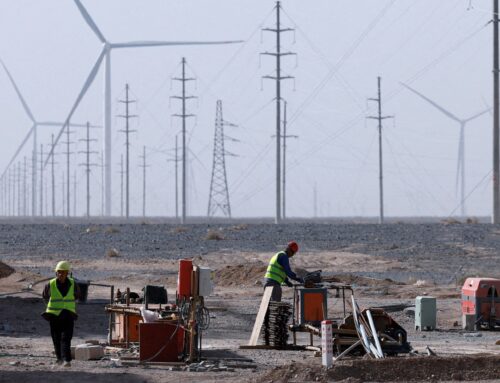New Business Polling Reveals The Unstoppable March Of Clean Power
April 23, 2025
The dominance of fossil fuels in the power system is over. Across fifteen of the world’s largest economies, from the steel mills of India to the data centres of the United States, business leaders are backing the energy transition. Not as a vague hope. Not as greenwashing. But as operational doctrine.
In a global poll of nearly 1,500 senior executives, 97% support a rapid shift to a renewables-based electricity system. Almost 80% want that shift by 2035 or sooner.
This is not ideology. It’s economics.
The past decade has seen a tug-of-war economy – pulled forward by innovation, dragged back by crisis. Trade wars, pandemics, conflict in Europe, broken supply chains, and now another round of global instability. The current moment isn’t new, but it’s sharper. What business leaders crave is certainty: stable and predictable rule of law, stable prices, secure supply, and political systems they can trust.
Energy is the lifeblood of any economy. Electricity is the most efficient form of energy, and renewables-generated electricity a value-add to businesses and economies. In many countries, fossil fuels, with their exposure to imports and volatility to geopolitical shocks, are a liability. For business, this isn’t just inconvenient. It’s dangerous. Volatility drives up costs, turns strategic planning into guesswork and delays investment.
In 2024, clean energy accounted for a record 10% of China’s GDP. With total sales and investment reaching 13.6trillion yuan ($1.9trillion), the sector is now overtaken real estate sales in value. The price of renewables all over the world has plummeted. Wind and solar are cheaper, faster to deploy, and more secure than coal or gas. For years, the fossil lobby has painted business as reluctant to change – hostage to coal, addicted to gas. But this new polling reveals the truth: it is not business slowing the transition, but politics. Companies are already planning their escape.
The sentiment is strongest where it once seemed impossible. In South Africa, an overwhelming majority of executives surveyed want their country to phase out coal from electricity generation in the next decade. In countries where gas plays a significant role in power generation, business intent for transitioning away from gas within the next decade is particularly high in the UK (76%) and Mexico (75%). In fact, two-thirds of polled executives want coal phased out and replaced with renewables, grids and storage – without locking in new gas infrastructure. And in fossil fuel-heavy Canada, 96% of executives back the transition to a renewables-based power system.
This is the voice of the market. And it’s telling us the future is renewable.
What makes this even more striking is the reason. Business leaders are not swayed by moral appeals or doomscrolling. They are protecting business interests by wanting to lower risk: renewables mean lower costs, more stable energy, and more predictable profits. Three quarters of those polled associate renewables with energy security, while only 45% have that association with fossil fuels.
A significant proportion of businesses say they are prepared to relocate operations or supply chains to regions with better access to renewable electricity, and of these nearly 90% say they could do so within the decade.That’s a clear signal business leaders see their owninterests at riskin markets that fail to keep pace with the energy transition. When clean, reliable power isn’t available, they’ll go where it is.
Why are governments still lagging behind? They cling to outdated subsidies for oil and gas, delay grid upgrades, and tinker with timelines. Companies are not waiting for governments to do all the heavy lifting. Of those polled, half are preparing to invest in on-site renewables in the next five years. Nearly all have or are mapping out how to phase out fossil fuels. And yet they keep running into the same barriers: red tape, unclear government targets, and weak infrastructure.
This is not a technical problem. It is a problem of leadership.
Where leadership is stronger, the results are clear. The United Kingdom set a clear date to end coal, backed it up with policy, and beat its own deadline. Businesses responded with investment. Spain became a leader in renewables through early government support, including generous subsidies and feed-in tariffs that spurred rapid investment in wind and solar energy. The recipe is simple: set targets, build enabling policies, incentivise investment, train workers, and watch the cake rise. More than 100 private sector organisations have joined a call for governments to anchor renewable energy and energy efficiency in national energy policy. But many governments, especially in the G20, are still dragging their feet – bound to coal, gas exporters, and legacy interests.
They should take heed. The world’s corporations are on the move. If national governments won’t provide the conditions for clean power, businesses will consider relocating to those that do.
The next round of Nationally Determined Contributions – the climate plans each country must submit under the Paris Agreement – are due this year. They must be more than slogans. They must provide roadmaps that translate into real policies and regulation on the ground. Real dates, real investments, and real ambition. The global economy has already made its choice. The only question now is whether politicians will catch up.
Search
RECENT PRESS RELEASES
Related Post




